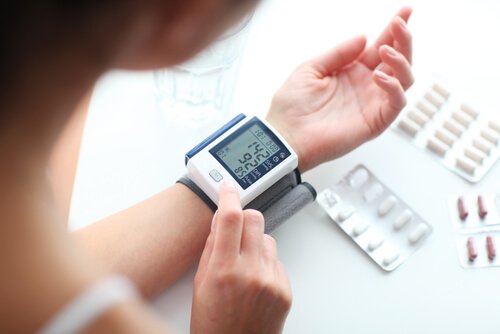Arterial Hypertension in Women

It’s worth pointing out a few important numbers: Approximately one billion people suffer from high blood pressure around the globe.
A silent and very widespread illness
This illness is considered to be a “silent killer.” The title originates in the fact that there are usually no apparent symptoms.
On a worldwide level, about 57% of people who suffer from arterial hypertension are unaware of their condition.
If high blood pressure is not treated correctly, the possibilities of organ damage increases. The risk of damage to other organs – such as the heart, kidneys, brain and even the eyes – also increases.
The risk of suffering arterial hypertension for women increases with age. Around 40% of people over the age of 65 have high blood pressure.
Blood pressure is the force with which the heart pumps blood against the walls of the arteries. When blood pressure is high, this means that the heart is working harder to pump the blood. This then creates damage on the arterial walls. Blood pressure measurement consists of two different numbers:
- Systolic blood pressure: Systolic blood pressure refers to the pressure in your blood vessels when your heart beats. Normal systolic blood pressure is 120/80 mmHg.
- Diastolic blood pressure: This second number refers to the pressure in your blood vessels between heart beats – when you heart is at rest. When constant pressure remains above 140/90 mmHg, this is an indication of hypertension.

The most common causes
In women of childbearing age, one of the causes of high blood pressure are contraceptive pills. When this occurs, women can opt for other birth control methods to avoid pregnancy. Once a woman stops taking the pill, her blood pressure levels will go back to normal.
During the period of menopause, arterial pressure in women also increases. This is due to the hormonal changes and decrease in estrogen levels that appear during this stage. As women age, high blood pressure becomes more and more common, and the rates surpass those of men in the same age group.
One of the most serious types of arterial hypertension in women is that which occurs during pregnancy. High blood pressure while a woman is pregnant can bring about serious consequences like convulsions (eclampsia) and problems with the baby’s development.
Obesity, sendendarianism, and stress are also among the causes of high blood pressure in women. Another factor that heightens a woman’s risk is the presence of polycystic ovaries.
Why women should pay attention to the issue of high blood pressure
Until a short time ago, it seemed that cardiovascular illness was reserved exclusively for men. However, reality has proven us wrong. Currently, heart disease is the principle cause of death for women.
One in every 200 women dies as a result of breast cancer. At the same time, cardiovascular illness is the cause in one out of every three deaths in women. As you can see, keeping our heart healthy is an extremely important issue.
Arterial hypertension usually doesn’t produce symptoms. However, it’s important that we pay attention to any sign that could be an indication of high blood pressure. For example, taking your blood pressure on a regular basis is the best way to discover any irregularity.

Prevention and treatment
Visiting a cardiologist should be just as important for women as going to see the gynecologist. Women with high blood pressure are much more prone to cerebral hemorrhage than men are, and the consequences are much more serious.
It’s no secret that men have to be careful of high blood pressure, but now it’s just as vital for women to be cautious. Look into your family health history.
If there’s a history of high blood pressure, then you need to take steps towards prevention. Watching your cholesterol levels is another important part of avoiding arterial hypertension.
The treatment of hypertension involves the administration of specialized medication in controlled dosages. Following a healthy diet and staying active also contributes to heart health.
Maintaining normal blood pressure levels will help to greatly reduce the risk of cardiovascular disease, cerebrovascular accidents and kidney failure.
It’s worth pointing out a few important numbers: Approximately one billion people suffer from high blood pressure around the globe.
A silent and very widespread illness
This illness is considered to be a “silent killer.” The title originates in the fact that there are usually no apparent symptoms.
On a worldwide level, about 57% of people who suffer from arterial hypertension are unaware of their condition.
If high blood pressure is not treated correctly, the possibilities of organ damage increases. The risk of damage to other organs – such as the heart, kidneys, brain and even the eyes – also increases.
The risk of suffering arterial hypertension for women increases with age. Around 40% of people over the age of 65 have high blood pressure.
Blood pressure is the force with which the heart pumps blood against the walls of the arteries. When blood pressure is high, this means that the heart is working harder to pump the blood. This then creates damage on the arterial walls. Blood pressure measurement consists of two different numbers:
- Systolic blood pressure: Systolic blood pressure refers to the pressure in your blood vessels when your heart beats. Normal systolic blood pressure is 120/80 mmHg.
- Diastolic blood pressure: This second number refers to the pressure in your blood vessels between heart beats – when you heart is at rest. When constant pressure remains above 140/90 mmHg, this is an indication of hypertension.

The most common causes
In women of childbearing age, one of the causes of high blood pressure are contraceptive pills. When this occurs, women can opt for other birth control methods to avoid pregnancy. Once a woman stops taking the pill, her blood pressure levels will go back to normal.
During the period of menopause, arterial pressure in women also increases. This is due to the hormonal changes and decrease in estrogen levels that appear during this stage. As women age, high blood pressure becomes more and more common, and the rates surpass those of men in the same age group.
One of the most serious types of arterial hypertension in women is that which occurs during pregnancy. High blood pressure while a woman is pregnant can bring about serious consequences like convulsions (eclampsia) and problems with the baby’s development.
Obesity, sendendarianism, and stress are also among the causes of high blood pressure in women. Another factor that heightens a woman’s risk is the presence of polycystic ovaries.
Why women should pay attention to the issue of high blood pressure
Until a short time ago, it seemed that cardiovascular illness was reserved exclusively for men. However, reality has proven us wrong. Currently, heart disease is the principle cause of death for women.
One in every 200 women dies as a result of breast cancer. At the same time, cardiovascular illness is the cause in one out of every three deaths in women. As you can see, keeping our heart healthy is an extremely important issue.
Arterial hypertension usually doesn’t produce symptoms. However, it’s important that we pay attention to any sign that could be an indication of high blood pressure. For example, taking your blood pressure on a regular basis is the best way to discover any irregularity.

Prevention and treatment
Visiting a cardiologist should be just as important for women as going to see the gynecologist. Women with high blood pressure are much more prone to cerebral hemorrhage than men are, and the consequences are much more serious.
It’s no secret that men have to be careful of high blood pressure, but now it’s just as vital for women to be cautious. Look into your family health history.
If there’s a history of high blood pressure, then you need to take steps towards prevention. Watching your cholesterol levels is another important part of avoiding arterial hypertension.
The treatment of hypertension involves the administration of specialized medication in controlled dosages. Following a healthy diet and staying active also contributes to heart health.
Maintaining normal blood pressure levels will help to greatly reduce the risk of cardiovascular disease, cerebrovascular accidents and kidney failure.
All cited sources were thoroughly reviewed by our team to ensure their quality, reliability, currency, and validity. The bibliography of this article was considered reliable and of academic or scientific accuracy.
- Saudan, P., Brown, M. A., Buddle, M. L., & Jones, M. (1998). Does gestational hypertension become pre-eclampsia? British Journal of Obstetrics and Gynaecology, 105, 1177–1184.
- Pacheco, J. Hipertensión arterial en diferentes edades de la mujer. An Fac med. 2010; 71 (4): 257-64. [En línea].
- VV.AA. Hipertensión en la mujer. Sociedad Argentina de Hipertensión Arterial. [En línea].
This text is provided for informational purposes only and does not replace consultation with a professional. If in doubt, consult your specialist.








